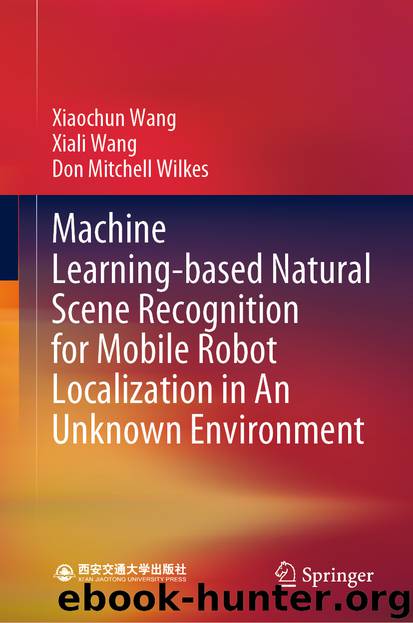Machine Learning-based Natural Scene Recognition for Mobile Robot Localization in An Unknown Environment by Xiaochun Wang & Xiali Wang & Don Mitchell Wilkes

Author:Xiaochun Wang & Xiali Wang & Don Mitchell Wilkes
Language: eng
Format: epub
ISBN: 9789811392177
Publisher: Springer Singapore
(2)To utilize the above observation, a favorable property of kNN is that the k-th nearest distance to each data point is a monotonic nonincreasing function of the portion of the dataset already explored (Angiulli and Pizzuti 2005; Angiulli et al. 2006; Angiulli and Fassetti 2009).
(3)As shown in Fig. 8.3, when searching for kNN for a data point, say p, it could be more efficient if more than one close data points are searched together, say all the data points no more than r distance away from p, so that the average number of distance computations can be much smaller than that when only one is searched. This is where triangular inequality can be of some help. Suppose that p and q are R distance apart. Data point q could have only one distance computation with p for it to be pruned from its distance computations with all those data points r distance from p, if R > 3r. Further, if R is larger than the sum of 3r plus the current k-th distance (not necessarily k-th nearest distance) of q, the k neighbors of q could be pruned from search as well.
Fig. 8.3Illustration of triangle inequality
Download
Machine Learning-based Natural Scene Recognition for Mobile Robot Localization in An Unknown Environment by Xiaochun Wang & Xiali Wang & Don Mitchell Wilkes.epub
This site does not store any files on its server. We only index and link to content provided by other sites. Please contact the content providers to delete copyright contents if any and email us, we'll remove relevant links or contents immediately.
| Coding Theory | Localization |
| Logic | Object-Oriented Design |
| Performance Optimization | Quality Control |
| Reengineering | Robohelp |
| Software Development | Software Reuse |
| Structured Design | Testing |
| Tools | UML |
Deep Learning with Python by François Chollet(12564)
Hello! Python by Anthony Briggs(9911)
OCA Java SE 8 Programmer I Certification Guide by Mala Gupta(9794)
The Mikado Method by Ola Ellnestam Daniel Brolund(9775)
Dependency Injection in .NET by Mark Seemann(9335)
Algorithms of the Intelligent Web by Haralambos Marmanis;Dmitry Babenko(8293)
Test-Driven iOS Development with Swift 4 by Dominik Hauser(7758)
Grails in Action by Glen Smith Peter Ledbrook(7693)
The Well-Grounded Java Developer by Benjamin J. Evans Martijn Verburg(7557)
Becoming a Dynamics 365 Finance and Supply Chain Solution Architect by Brent Dawson(7023)
Microservices with Go by Alexander Shuiskov(6790)
Practical Design Patterns for Java Developers by Miroslav Wengner(6702)
Test Automation Engineering Handbook by Manikandan Sambamurthy(6644)
Secrets of the JavaScript Ninja by John Resig Bear Bibeault(6409)
Angular Projects - Third Edition by Aristeidis Bampakos(6050)
The Art of Crafting User Stories by The Art of Crafting User Stories(5583)
NetSuite for Consultants - Second Edition by Peter Ries(5515)
Demystifying Cryptography with OpenSSL 3.0 by Alexei Khlebnikov(5318)
Kotlin in Action by Dmitry Jemerov(5061)
